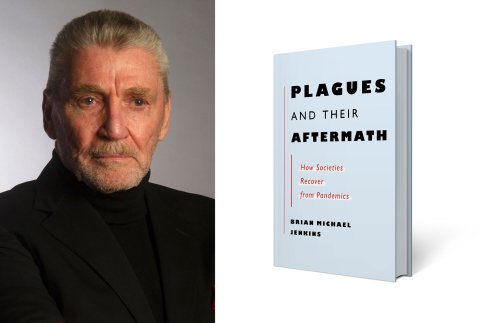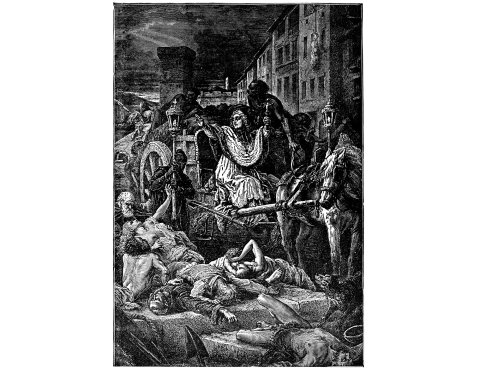What is it like to write a book about plagues during a worldwide pandemic? Terrorism expert Brian Michael Jenkins, senior advisor to the president of the RAND Corporation, did just that in his new book, Plagues and Their Aftermath: How Societies Recover from Pandemics (Melville House, September). In his book, he delves into what our world might look like post-pandemic—from the economic and political repercussions to armed conflict and bioterrorism—through the lens of other pandemics throughout history. In this Q&A, Jenkins talked to Newsweek about what effect the war in Ukraine has had on COVID-19 response, whether partisanship delivered a "mortal blow" to America and whether there's cause for optimism in the face of so much disturbing news.

You immersed yourself in the study of plagues during a pandemic. What was that like?
Actually, I didn't set out to write this book. I had written a chapter on whether COVID-19 would increase the likelihood of future political violence for an academic book in Europe. In the process, I became fascinated by the legacies of pandemics. Since COVID-19 was keeping me off airplanes, I traveled back and forth in time through books and research reports, exploring post-pandemic landscapes, comparing them to what was happening here and now. Like any explorer, I kept a journal of my travels—it became the book.
Your field of study is generally terrorism. What effect has COVID-19 had on worldwide terrorism?
There is no straight line from testing positive to terrorist bombings. Some terrorist leaders welcomed COVID-19 as an ally against their enemies. Others saw the resentment and anger over control measures as an opportunity to spread anti-government propaganda and recruit new followers. Major outbreaks of disease foment unrest, in some cases riots, and potentially acts of terrorism.
The pandemic has , although the pandemic does not offer terrorists new capabilities or open paths they haven't already thought about before. However, more people thinking about how they might weaponize a pathogen or exploit current apprehensions to create terror is hardly a positive development.
Is there a correlation between pandemics and armed conflict? A causation?
Throughout history, epidemics and wars circle each other like binary stars. Warfare has been incessant for much of human history. Epidemics occur regularly. The two frequently overlap. Invading armies carried plagues with them, and died from it. Until very recently in history, more soldiers died from disease than wounds. While some research on recent wars shows a correlation between high disease stress and the prevalence of armed conflict, especially internal conflict, causation in the case of wars between countries is harder to prove.
How did COVID impact the war in Ukraine?
I would reverse the question: How does the war impact the pandemic? In its first two years, COVID-19 hit Russia and Ukraine especially hard. Both countries were in the upper tier of COVID deaths per million.
Ukraine's public health system was ill-prepared. There were too few trained medical personnel and public health workers, and shortages of equipment and supplies. Ukraine also had one of the lowest vaccination rates in Europe; as of August 2022, still only 32 percent of the population are fully vaccinated. The war destroyed what was left of the public health system. Hospitals were shelled. Immunizations—not just against COVID-19, but childhood diseases—stopped. We have no accurate figures of how many people have died of illness in bomb shelters or were killed in missile attacks. Five million refugees fled Ukraine to Europe. National survival, not a virus, is the country's primary concern.
Some analysts attribute Putin's decision to invade Ukraine at least partially to the two years he spent in extreme isolation as a consequence of the pandemic. It may have been a radicalizing experience that fueled his festering sense of grievance, messianic ambition, and most dangerously, his overestimation of Russia's and his own power. A delusion of omnipotence is a dictator's disease. But this is remote psychoanalysis—who knows?
Russia went into the war in somewhat better shape in terms of public health and vaccination rates—52 percent are now fully vaccinated. But the war in Ukraine has also changed priorities and creates new problems.
What effect from COVID on society are you most concerned about?
We face a host of new threats—not just further variants of COVID-19 and new and resurgent diseases we thought we had corralled, but major wars that, along with drought, bring famine. The Hebrew prophet Ezekiel named four punishments: pestilence, war, famine and "wild beasts." Today, the wild beasts might describe us.

What was the most surprising thing you learned in your research?
Although political differences were manifest in many previous pandemics, I have to admit that I was surprised—and saddened—by the extraordinary degree to which COVID-19 cleaved an already divided nation. An effective response to a pandemic requires a community effort. Instead, public health officials and frontline workers were often vilified, threatened and sometimes attacked. Political affiliations even dictated personal medical decisions, which I thought would be a matter between individuals and their physicians. Rather than applaud those who dedicated themselves—and in some cases died—trying to save lives, there are still those who talk about reckonings. What the hell has happened to America?
That's a pretty dark assessment, are you pessimistic?
Americans are a pessimistic people, though not the most pessimistic compared with other countries. We are, however, obsessed with decline and doom. And historically, pandemics heighten pessimism. The pandemic exposed our weaknesses, it did not deliver a mortal blow. I believe American institutions and, more importantly, Americans are resilient. Since the beginning of the last century, we have come through two world wars and several other costly conflicts, and a long and extremely dangerous Cold War. We have now survived two major and several lesser pandemics, a great depression, and a severe recession. There were times when the country seemed ready to tear itself apart—and there is no guarantee we won't do so now. Yeah, I think a lot of people are crazy and some of them don't deserve the time of day, but I've got work to do and complaining, shouting, cringing or wringing my hands while waiting for someone else to save me isn't going to get it done. I'm inclined to think that describes most Americans. Which is why I remain optimistic.







